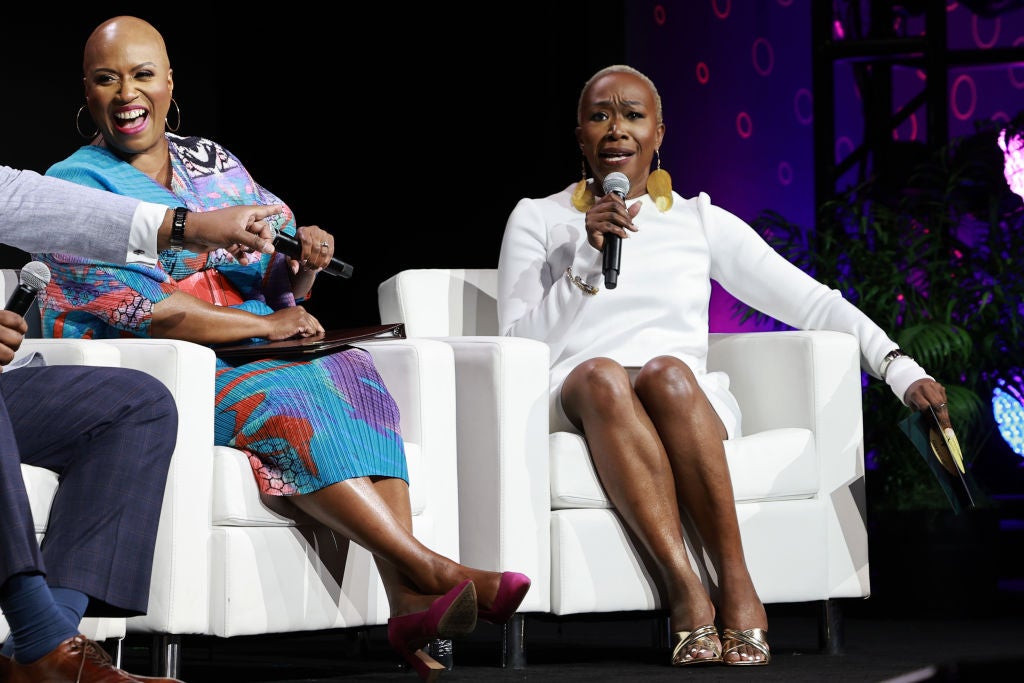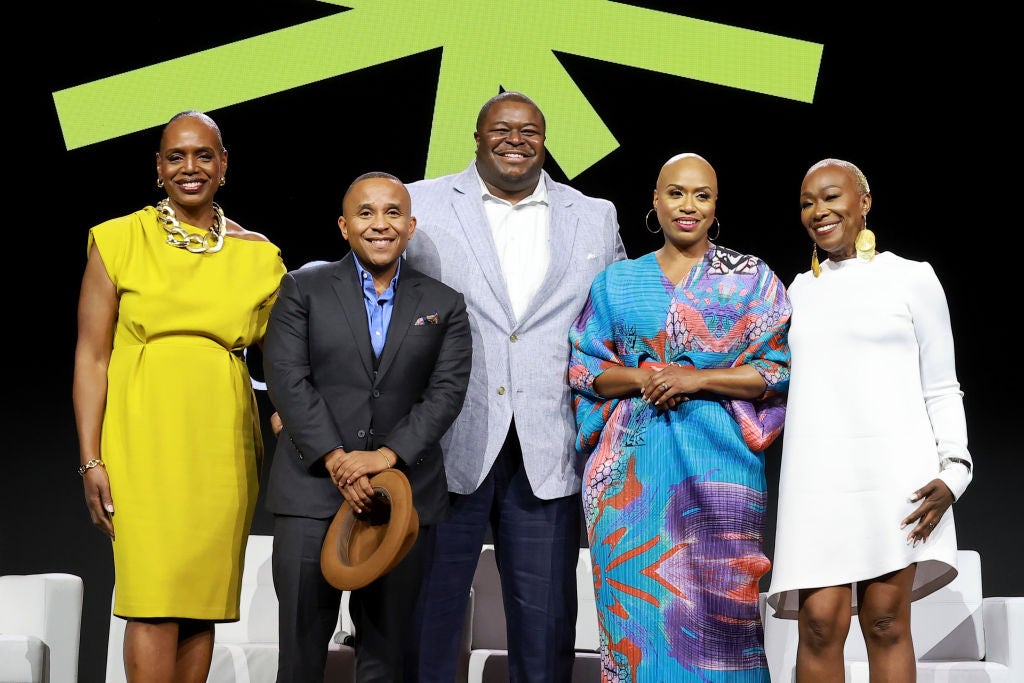
Following the presidential debate, there has been much discussion on the importance of voter turnout in this election, specifically Black voter turnout. The 6-3 Supreme Court ruling that ended affirmative action last year was made a reality because of the three federal judges appointed by former President Donald Trump.
At ESSENCE Fest 2024, the Black Global Economic forum panel titled “Wake Up: All The Things” provided a detailed analysis of the repercussions of such decisions and others like it and invaluable information for preparing for this upcoming election.
This panel’s speakers included Congresswomen Ayanna Pressly, President and CEO of the Congressional Black Caucus Foundation (CBCF); Nicole Austin-Hillery, President and Executive Director of Lawyers’ Committee for Civil Rights Under Law Damon T. Hewitt, and Rashad Robinson, President of The Color of Change. MSNBC’s Joy Reid, host of The ReidOut, moderated the conversation.

With only a 23% voter turnout for the 2023 gubernatorial race, Louisiana has become a poster child for extremely low voter turnout. As a result, Republican Jeff Landry won the election with 51.6% of the votes. In just seven months of being in office, he has made major legislative changes in the state of Louisiana, such as eliminating parole, permitting two more methods of lethal injections, and making concealed carry of handguns without permits legal.
Reid made a point to highlight how Louisiana’s low voter turnout will disproportionately affect the Black population in the state. For predominantly Black cities, such as New Orleans, they will feel the impact of these new legislations quickly and excessively.
“This state was actually making progress, particularly on incarceration, which is a big deal, and on education, they were coming up off the bottom,” Reid said. “Within a very short period that has been reversed, we are now seeing the state becoming more aggressive again about incarcerating particularly black folks. We are seeing the state slide back down education and implement some of the most draconian laws and procedures in the entire country to harm education,” she added.
72% of white Louisianians participated in the election compared to 24% of Black voters, putting into perspective who is governing who in the state. Reid pointed out that this means that Black folks in more progressive states possess more power than those of Black Louisianians.
Congresswoman Pressly feels that low Black turnout is a result of broken hearts, promises, and systems. As the first Black female congresswoman in Massachusetts in 200-plus years, she explained that she was able to encourage Black voters to show up at the polls.
“So what I try not to do is to talk people out of their lived experience, but instead do the work of restoring their faith and their trust in government that both motivates people to vote at every level of government, but also incentivizes more people to run for office,” said Pressly.

The recent promotion of extremely conservative republican politicians, such as Donald Trump, Ron DeSantis and Jeff Landry, has played a major role in discouraging Black voter turnout.
“In this 118th Congress with the Republican majority having the gavel, which has been nothing but chaos and dysfunction,” said Pressly.
“They govern, and I’m being generous with content, callousness, and chaos that only further incentivize people from participating because it has been so dysfunctional. So there is a deficit of faith and trust in government institutions at every level,” she said.
Contrary to the current lack of political engagement in Louisiana, the state was a trailblazer for Black political progress during the Reconstruction era. Following the Civil War, Louisiana was at the forefront of national-level political improvements for Black Americans, setting a precedent that contributed to the landmark Civil Rights Act of 1964.
This crucial legislation, which aimed to eliminate discrimination in education, criminal justice, and healthcare, was a direct outcome of the groundwork laid by Louisiana’s political activism during Reconstruction.
“It was southern Black people who stood up to the Democratic Party at the time,” said Joy Reid, highlighting the critical role played by Black Southerners in challenging and reshaping political norms.
As the nation commemorates the 60th anniversary of the Civil Rights Act of 1964, there is a bittersweet recognition of the progress and enduring struggles that persist. Reid expressed a heavy heart for the ongoing battles against discrimination, noting that while the act was a monumental step forward, the fight for true equality in education, criminal justice, and healthcare continues.
Reflecting on the Reconstruction era, historian Hewitt proposed the need for a new era of reconstruction. “We need a new Reconstruction era, one that takes the stance of both offense and defense in protecting the liberties of Black Americans,” Hewitt asserted. This modern reconstruction would not only safeguard existing rights but also proactively address systemic inequalities that continue to plague Black communities.
“We need a set of rights that are positive rights about we have the right to education, we have the right to housing, we have the right to safety in our own terms, not just being police in our own communities,” said Hewitt. “We have the right to economic opportunity. We need a whole realm of positive rights in this country. That’s what the third reconstruction has to be about,” he said.
Additionally, following the most recent presidential debate, many Americans voiced their disappointment in the candidates. Hewitt says that this notion of hopelessness is not about the candidates specifically but about reducing the harm that will be done under their administration.
“A hometown hero, a woman who leads an organization called Women With A Vision, Deon Haywood, who’s here in New Orleans. She said just the other day voting is harm reduction, but it’s also harm reduction because you can make policy happen or let policy happen to you,” said Hewitt.
This panel also discussed Project 2025, a plan devised by the Republican party that would reshape the federal government and would be enacted within the first hundred 180 days of the next administration should Donald Trump is re-elected.
The slate of policies presented includes banning the abortion pill mifepristone, rolling back rights for the LGBTQA+ community, dismantling the Department of Education, implementing plans for mass deportations, and significantly increasing the number of federal government roles filled by presidential appointees, thereby eroding the system of checks and balances.
“I don’t want us to be confused because they put it on paper, they put it on white paper exactly what they’re going to do, and they backed it up with green paper, and they backed it up with clear resources over and over again,” said Robinson.
“The odds appear to be stacked against us, however there are still ways to combat this very direct attack on Black America,” said Austin-Hillery, who laid out how we must educate and empower our community this election in order to stand a fighting chance.
“We have to empower our people with information that is key to us, ensuring that we can fight back against all of these things,” said Austin-Hillery. We have got to be in our communities having conversations, sharing information,” she said.







